1. What is your first memory of discovering fantasy or horror literature?
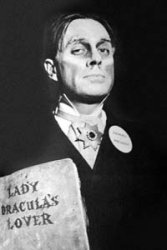 When I was seven or eight, our class at school took a trip to the library. There, we learned how to use those library card files that are now passé, which seemed so complicated at the time, and were taught how to figure out the Dewey decimal system. I'd already been a horror fan of all the horror-ish shows on TV then and, whenever I had the chance (not often because of school, but usually in summer it worked out), I stayed up to watch the late night horror movies.
When I was seven or eight, our class at school took a trip to the library. There, we learned how to use those library card files that are now passé, which seemed so complicated at the time, and were taught how to figure out the Dewey decimal system. I'd already been a horror fan of all the horror-ish shows on TV then and, whenever I had the chance (not often because of school, but usually in summer it worked out), I stayed up to watch the late night horror movies.
The host was Roland (John Zacherle), who played a ghoul (known as "The Cool Ghoul"), a wacky figure dressed in formal attire, who spoke to My Dear (as she silently and invisibly slept, all the time it seemed, in her coffin) and his assistant Igor, whom we knew existed because of chains rattling in the background. This was in Philadelphia, where I was born, and I'm sure I was madly in love with Roland and crushed when they carted him off to New York to host the show there. But I digress.
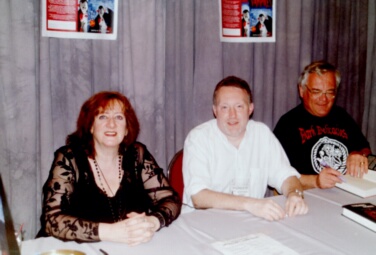
Nancy Kilpatrick with Stephen Jones and Ramsey Campbell at the 2004 World Horror Convention in Phoenix, Arizona
|
That trip to that old, vaulted Victorian building that housed the library intrigued me. While there, we were allowed to select a book we could take home and read, and I do believe that this was the first book I read on my own—apart from what was required at school, or what was read to me as a child. Not that we didn't have books in the house, just not children's novels. The book I selected was called THE LITTLE WITCH. I have no idea who the author was, and I only remember that the story was about a little girl who had witch-like qualities and could perform magic.
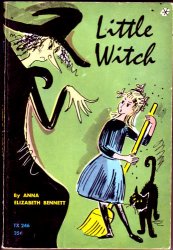
I think I selected this book because of an experience I had around the age of six or seven. I remember being in the back bedroom of our house, which was the bedroom of my grandmother and grandfather. I was alone, it was night, and I was waiting for them to come in because I think I was sleeping with them that night for some reason—maybe we had a guest. I was their darling anyway, so this was a good experience for me. While waiting on the bed where I was sitting, I looked out the window into the dark night. Just then, a witch rode by on a broomstick. She was a stereotypical witch, wearing the conical hat, and possessing a hooked nose with a wart on it, the vehicular broom from another era. As she passed by in slow motion, she looked in the window directly at me. This did not frighten me at all. I didn't tell anyone, but I think by the time I got to the library, that was on my mind and I wanted to find out more about witches. Psychologists would say the witch was me, and that I was a tricky little thing, and maybe that's true. But that book launched a love of reading that has served me very well throughout my life, and complemented my love of horror movies.
2. What made you want to become a writer and who are your major influences?
I started writing around the age of seven or eight. It seems like a lot of important moments in my life can be traced back to those ages. My grandfather worked as a weaver at the Hardwick & McGee carpet factory in Philadelphia. He adored me, and often brought me presents, ranging from puppies to swatches of carpet. And one time he brought me a small portable manual typewriter. I did hunt and peck and knocked out little poems and stories, but I don't recall any of them now.
In high school I took a half-commercial, half-academic course, so I could go either way, and one of the classes was typing. The inner city school had the old clunky manual typewriters, none of the sleek IBM selectrics with changing ball fonts that were all the rage out in the larger world, and I learned to type on that monster. The keys were sooooo stiff and you really needed to pound them to get the hammer to strike the ribbon and make a decent impression on the paper behind. I excelled in this limited hand/eye co-ordination task and had "A"s in the class. Once I'd finished the assignments at my break-neck speed, I used the time that was left to type more stories. No one saw these, of course. I was very shy, and the last thing I would have done was show my writing to anyone.
Then, in my last year of high school, I acquired a boyfriend who was in his first year of college. I wrote poems and essays as well as fiction back then, generally the outraged thoughts of the young, trashing society and declaring that "Things Aren't Working". My other big theme was "God and Why Did He Let Such Bad Things Happen to Us!?" I risked showing my boyfriend, Paul, an essay. He "borrowed it" to read and then when he gave it back said he had shown it to his English professor and that man deemed it good and wonderful and blah blah blah, all the things I needed to hear to encourage me to keep going.
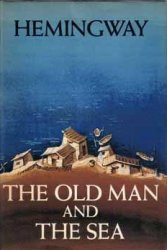 After all this, a few traumatic events occurred (a few more, I should say), and I didn't write for several years. Eventually, I was travelling around and lived in different places, had gotten married and divorced, and ended up moving to Canada. Life was chaotic. Finally settled, I started writing again—this time articles, which I published in what were then called "Underground Newspapers". I published quite a few pieces: in a paper in Toronto called HARBINGER; when I moved to Montreal I wrote for LOGOS; back in Toronto I worked with ALTERNATIVE TO ALIENATION. During this time I focused on non-fiction. Eventually I returned to fiction and tried to write "literary" stories, but they were always dark, and few saw publication.
After all this, a few traumatic events occurred (a few more, I should say), and I didn't write for several years. Eventually, I was travelling around and lived in different places, had gotten married and divorced, and ended up moving to Canada. Life was chaotic. Finally settled, I started writing again—this time articles, which I published in what were then called "Underground Newspapers". I published quite a few pieces: in a paper in Toronto called HARBINGER; when I moved to Montreal I wrote for LOGOS; back in Toronto I worked with ALTERNATIVE TO ALIENATION. During this time I focused on non-fiction. Eventually I returned to fiction and tried to write "literary" stories, but they were always dark, and few saw publication.
Eventually I realised it made no sense to try to squeeze a round peg into a square hole, so I returned to my life-time love of horror and that's where I've been ever since, with a few forays into other genres—mystery, fantasy, a sniff at science fiction, etc.
I think I became a writer because I could do it, and there was nothing else I could do that fluffed out my soul so much. You hear writers say that all the time—"There's nothing else I can do". I think it's true for many of us. Writing is a way of communicating with yourself, and also with the world. It works on both of those levels, which intrigues me. You create words on paper with an emotional undercurrent, that tell a story. But in the reworking of that story you make it as clear and sharp as you can so that others not only understand it, but can also catch your deeper intentions. I've been enriched by writing.
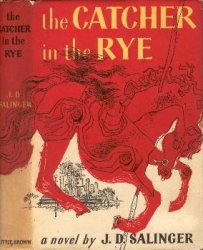 My inner life swells at times. I'm often in awe of what's on the page, and in one sense it's hard for me to realise that it was "I" who wrote it. Writing still appears magical to me, as does reading. A gift from a source that is beyond humanity. When I read a book that takes me above and beyond myself and opens new doors, I'm in awe, transformed in some small way. It really is as if magic has touched my life. I find that for both writing and reading.
My inner life swells at times. I'm often in awe of what's on the page, and in one sense it's hard for me to realise that it was "I" who wrote it. Writing still appears magical to me, as does reading. A gift from a source that is beyond humanity. When I read a book that takes me above and beyond myself and opens new doors, I'm in awe, transformed in some small way. It really is as if magic has touched my life. I find that for both writing and reading.
I've had a lot of influences. One of the first books that I loved was THE CATCHER IN THE RYE. I loved DRACULA and FRANKENSTEIN and DR. JEKYLL & MR. HYDE. I loved everything Oscar Wilde wrote. I loved everything Franz Kafka wrote. I have devoured a wide range of fiction: A TREE GROWS IN BROOKLYN; THE OLD MAN AND THE SEA. Gorky and Dostoyesfsky and Camus and Gide. THE STORY OF 'O' and the work of the Marquis de Sade. Saki and Margaret Atwood. I have loved so many books and stories that it's impossible to name them all, and they are not just in the horror field, obviously.
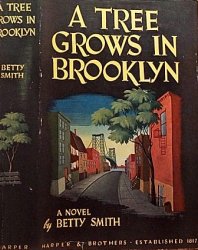
I have a collection of about 1,700 titles that are all vampire books, mostly novels. I'd say I've been enthralled by maybe 30% of them. Another 30% are utter crap, but I loved them anyway in the way I love "B" or "C" or "D" movies. The rest are somewhere in the middle and I loved them because they exist. The same with vampire films, and I've seen all that I can get my hands on. Every book, every movie, every experience I've had in my life has influenced me and I'd be hard pressed to identify anything specifically that set the stage for horror writing, but I will say this: there was an inordinate amount of death and madness and grief in my family as I was growing up. Even violence. All of that has to be the underpinning of my interest in horror fiction, because in a way my life was a horror. One I survived. I try to let my characters survive, but they don't always make it. Some do, some don't. Such is life in the real world, and in fiction.
3. How difficult was it for you to first get published?
Not difficult at all—for non-fiction and short stories. A friend and I in high school co-wrote a story and sent it to a women's magazine under a pseudonym and it was published. I won't give the name of the magazine, although it was large circulation and well-known. That was encouraging, but then that friend and I had a falling out, and other things were going on in my life and I didn't try again until the 1980s, at least with fiction.
As I said, I'd been publishing non-fiction since the early 1970s. When I began writing fiction stories in the 1980s I was working on "literary" stories. I had a bit of success here and there, nothing to write home about, but the stories were always so dark, and I kept getting responses like that (when the editors would bother to say anything specific). Finally I was a runner-up in THE TORONTO STAR'S annual short story contest. The story I wrote was 'Root Cellar', the literary version. As I read it in the paper I thought, "Why am I trying to write short stories in the literary realm?" This is clearly horror. Eventually I re-wrote that story as a vampire story and sold it, and Karl Edward Wagner picked it up for his YEAR'S BEST HORROR SERIES.
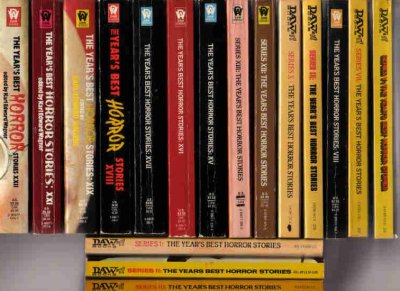
|
That's short fiction. Ask me about novels, and my experiences are entirely different. The first novel I wrote was BLOODLOVER, a vampire novel. That was in 1975. I finished it in nine months, on a typewriter. In 1976 Anne Rice published INTERVIEW WITH THE VAMPIRE, and I thought, in my na´vety, "Well gee, this is surely the right time for me!" I sent letters to thirty-six publishing houses asking if they'd like to see the novel. Thirty-five of them sent form letters or brief personal letters saying "No thanks!" The thirty-sixth, Manor Publishing, wanted to see it, so I sent it. I waited as the books on writing said to wait, and after a year I thought I'd better see what was up. I wrote. I phoned. I wrote and phoned some more. It took another year to get a letter saying that they had decided to not publish it and had returned the MSS. I was at the same address but it never arrived, and I figured they either tossed it or—in my more paranoid moments—thought that they published my genius opus in secret with someone else's name and a new title! Needless to say, this grim reception put me off trying to market that book for a number of years.
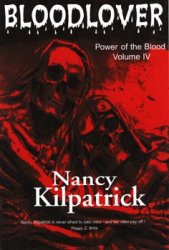
Meanwhile, I wrote a non-horror book, more of an autobiographical work disguised as fiction called IN THE JUNGLE. I grabbed a copy of LITERARY MARKET PLACE and found the names of agents who would handle a book such as that. I made a list of the top twenty agents. I sent letters to the top ten asking if they would read my novel, giving a synopsis in a short paragraph. I'd worked in the biz world and knew how to write a good letter. Eight of the agents said "nada". Two asked to see sample chapters. One wasn't interested after the samples, the other wanted to see the entire MSS. I sent it in and that agent, Henry Morrison, loved it and wanted to represent it. I was, needless to say, ecstatic. Ultimately, though, it did not sell. He sent it to eight major houses and while the majority had extremely favourable comments on the book, no one wanted it. This, of course, took years of time, and by then I had written another book as a followup to BLOODLOVER, called CHILD OF THE NIGHT. Henry did not want to represent a horror novel—likely because there was no real money in it—so there was no use in him even reading it, and we parted ways amiably.
I struggled for several years trying to find someone to read COTN, but the way publishing was set up then is the same way it is set up now—if you have an agent, you can get your MSS read. If you are already published, you can get your MSS read. No one wanted to read COTN. Undaunted, I wrote another vampire book, NEAR DEATH. My second husband and I had founded a writer's workshop by then, and I work-shopped all three titles over the years, completely re-writing BLOODLOVER many times. Initially, when I wrote it in 1975, it had been a touch sci-fi-ey in that it had futuristic elements: moving sidewalks; computers in shops; cryonic suspension, and much more. I'd set it in the year 2006. But in all the re-working I began to think—for good or ill—that I should remove many of the SF elements and change the time period and make it a kind of loose 1960s book, because that's when people were more wild and expressive and could wear Victorian drag and get away with it. Of course, eventually Goths began wearing Victorian drag in the late 1970s, 1980s, 1990s, today, so it ends up being a kind of current-feel story, what with the lavish lifestyles and money to burn that we read about now in all the entertainment magazines.
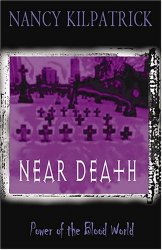
Around 1990 I had a big break with my short fiction, when F. Paul Wilson bought my story 'Leesville, LA' for his anthology FREAK SHOW (Borderlands Press). This was an HWA anthology and there was quite a bit of competition, and I was floored that I was in there. Pocket Books published the paperback edition and the editor there, Rebecca Todd, sent around galleys and asked us to call in changes, which I did. So, we had spoken, she was quite nice, and while I had her on the line I told her I'd written novels and was there anyone at Pocket I could send my vampire novel(s) to. She gave me the name of an editor, and I called that person and she said "Sure, send one". So I sent NEAR DEATH, that being set in New York, and by then I knew that novels set in NY are important to NY editors—especially the younger ones who come from Ohio or Missouri and work in NY and are trying to distance themselves from what many of them consider their hick roots.
I waited the requisite six months then phoned, and this editor had left the company. I phoned Rebecca and told her this and she said no one had replaced her yet but she gave me the name of another editor. I called him, sent him the MSS and waited six more months. I then phoned to discover that he too had left (and moved to Zebra—Kensington Books). I called Rebecca and told her, and she was very upset and said send the MSS to her. I did. About three weeks after I sent it, I received a form letter with my MSS back that read to the effect: "We did not read this because we do not read unsolicited MSS". I called Rebecca, irate, since she had solicited it. She said it was not her, she had my MSS right there in front of her to read, and it must have been one of the previous MSS I'd sent, even though both of those had been solicited. She was upset anew and promised to read NEAR DEATH over the weekend.
That weekend I went to a convention. While there, I spoke with an agent, who took me on (unfortunately for me—we split long ago, but not before she ripped me off for royalties). I came home to a phone call from Rebecca Todd wherein she told me how much she loved the book and wanted to publish it.
That was amazing for me. I couldn't believe it. The book came out in 1994, October, and around May of that year Rebecca asked for another book in what had become if not a series at least a "world". So I sent her CHILD OF THE NIGHT, which she also wanted to publish. I was flying! And crashed in September, the month before NEAR DEATH was released. Rebecca called and said that a) Pocket had put a moratorium on buying horror; and b) she was leaving the company in October. She said she'd pass it on to her replacement, but it might be a while before Pocket opened up to horror again, since sales in the genre had plummeted. This was, of course, the reaction of many publishers to the glut of horror titles in the 1980s—when the market was flooded by a lot of books, quite a number of which were cheesy, since every publisher was buying everything horror-ish that flew within grasping range, regardless of quality.
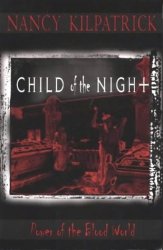 Eventually I sold CHILD OF THE NIGHT to Stephen Jones, who was editing a line for Robinson Publishing called Raven Books—a great line that died when Steve left. He had plans to publish the three titles in my vampire world, plus a fourth I would write, each as individual books and then two omnibus editions, containing two books each. But the publisher reneged on their agreement to give him carte blanche as the originator and editor of this imprint, and after a number of run-ins over a number of books, he quit. CHILD OF THE NIGHT did come out, though, and Steve kindly finished the editorial process with my book and saw it into the world. The novel received great reviews, and I think sold well, as NEAR DEATH did at Pocket. During all this, I was rolling with the "Darker Passions" series of erotic horror, with seven novels, and I edited five anthologies under my pen name, "Amarantha Knight". As well, White Wolf asked me to write a novel in their "Vampire: The Masquerade" world, and I brought in a co-author, Don Bassingthwaite, and we did AS ONE DEAD together. I also wrote DRACUL: AN ETERNAL LOVE STORY when the producer of the play asked me to write a novel based on the musical, which I did. The rest is history. Mine.
Eventually I sold CHILD OF THE NIGHT to Stephen Jones, who was editing a line for Robinson Publishing called Raven Books—a great line that died when Steve left. He had plans to publish the three titles in my vampire world, plus a fourth I would write, each as individual books and then two omnibus editions, containing two books each. But the publisher reneged on their agreement to give him carte blanche as the originator and editor of this imprint, and after a number of run-ins over a number of books, he quit. CHILD OF THE NIGHT did come out, though, and Steve kindly finished the editorial process with my book and saw it into the world. The novel received great reviews, and I think sold well, as NEAR DEATH did at Pocket. During all this, I was rolling with the "Darker Passions" series of erotic horror, with seven novels, and I edited five anthologies under my pen name, "Amarantha Knight". As well, White Wolf asked me to write a novel in their "Vampire: The Masquerade" world, and I brought in a co-author, Don Bassingthwaite, and we did AS ONE DEAD together. I also wrote DRACUL: AN ETERNAL LOVE STORY when the producer of the play asked me to write a novel based on the musical, which I did. The rest is history. Mine.
4. What's the difference between writing erotic and horror fiction?
The difference? The space between sex and fear.
With both types of fiction you are working to evoke a specific emotion in the reader. It's just the focus. What's truly difficult is erotic horror, or horrific erotica. There you're blending two worlds, trying to get both or either to work, and it's a tightrope; the writer can easily plunge to his or her literary death. Both of these genres are fun and can be over-the-top in a lot of ways, which makes them a lot more interesting to write and to read, in my view, than other genres.
5. What are the attractions of editing anthologies or compiling non-fiction books?
Editing anthologies is fascinating to me. I have so little time to read anymore, and when I edit an anthology I get to read stories by great writers. But that's not a real reason to edit. I love the process of trying to compile a collection of stories that work together. After all, short fiction is an entity unto itself, and in a sense collecting them into one anthology is a peculiar way of thinking, if you catch my drift.
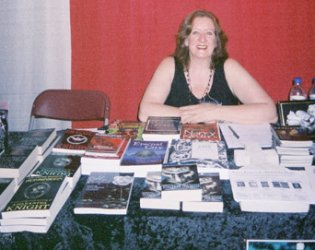
Nancy Kilpatrick at Rue Morgue's Festival of Fear, Toronto, ON, 2005
|
Sometimes anthologies are themed, which makes it a bit easier. Sometimes they are wide open, just in a general category of "horror" or "dark fantasy". But the stories have to work together, that's the bottom line, because the reader is reading many stories in one book, often in sequence. This is one thing that some contributors "get" and some don't. I've done anthologies where I've had to reject some amazing stories. It's very hard to tell an author that his or her story didn't make the cut. For most writers, that often feels as if the editor doesn't value the story, or think it's good, but that's not usually so. In the end, for me anyway, it's whether or not all the stories work as a whole. They don't all have to sound the same or be about the same small range of subject matter—actually that would be pretty ugly, I think. But they do have to work together in the sense that if the reader begins at the beginning and reads through to the end the way a novel is read, or starts at the back and works his or her way forward, there should be nothing jarring. Jarring in the sense that it feels as if it should be in another book and not this one.
There's a "feel" to an anthology, and that's a delicate thing that is achieved when the editor has a sense of what he or she wants to do, and stories come in that do that. And usually as the stories come in, they end up expanding the original idea—or at least for me that's how it works. I often need to sit with the stories that are the initial purchases and get a feel for where this book is going, which is usually not precisely where I envisioned it would go. The other thing is I like is editing great writers. To see an exquisite story by someone, and to love that story and to find in it this or that which doesn't quite work, or isn't understandable, or could be better—things the author can't quite see, but with the right eye the editor can see and identify—and being able to offer suggestions to the writer so that he or she can make the story even better, I love being able to help in that way.
I think of stories as jewels that are embedded in rock. A great writer will chip away at the rock so that the jewel shines through—that's reworking your writing. Sometimes, even after a lot of reworking, there might be a fragment of rock still there that the author didn't notice. I've found that 99% of the pro writers are very grateful for anything pointed out to them that doesn't quite work, or which could be made better. Not that people take every suggestion. But some are spot-on. I know as a writer I've been ecstatic when an editor bothers to give me editorial suggestions. This is a form of giving that is invaluable to a writer, who works alone in his/her world, and can use a second pair of eyes from someone who loves and values the story.
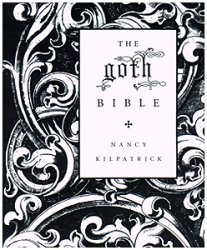 Non-fiction, well, apart from articles, and those torturous childhood essays, and a few film and book reviews, I've only written one non-fiction book of my own, although I've ghost-written five. THE GOTH BIBLE was my longest non-fiction work. It was a labour of love. It took a long time, I wasn't paid nearly enough for it, and it almost died several times through an editor change and a bookstore chain that refused to buy it (but later had a partial change of heart), and through timing itself—it was bought just after 9/11, when New York was in a stupor.
Non-fiction, well, apart from articles, and those torturous childhood essays, and a few film and book reviews, I've only written one non-fiction book of my own, although I've ghost-written five. THE GOTH BIBLE was my longest non-fiction work. It was a labour of love. It took a long time, I wasn't paid nearly enough for it, and it almost died several times through an editor change and a bookstore chain that refused to buy it (but later had a partial change of heart), and through timing itself—it was bought just after 9/11, when New York was in a stupor.
What makes it worth it to me is the number of e-mails and even one hand-written letter—imagine that—from people who have read THE GOTH BIBLE and felt less alone in the world because that book touches them. And there have been maybe half-a-dozen people who have been inspired by the book to make the leap and become who they are. In one case that meant the way they dress. In another, it meant overcoming fear and going to university. There is nothing comparable to this type of response to your work. I've had it for my fiction, and to have it for this poor book that went through hellfire to reach the light of the moon, well, it made it all worth it.
However, having said that, it was so much work—two years—and you can bet I wasn't paid for two years worth of labour, I'd be hesitant to do another non-fiction book. But, never say never.
6. Do you find the actual process of writing difficult?
No, not at all.
7. If you were not a writer, what would you like to be?
Rich!
8. Do you have any regrets becoming a full-time writer?
My only regret is that I did not realise when I was younger how it would be as I got older, both financially and in my field. I might have done things a bit differently. For many years, I was laid-back about writing. And while I was always angst-ridden about publishing, and do think that for a long time I did things wrong by trying to do them the "correct" way, it took me a long time to realise that the normal routes would never work for me. That my world is not a straight and narrow place, where you just do the right things and good things happen.
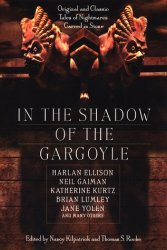 Most of my publishing has come about through quirky circumstances. For instance, I presented the idea for IN THE SHADOW OF THE GARGOYLE (edited by Thomas Roche and myself, published by Roc) to the amazing editor Ginjer Buchannan. I had no idea she, like me, was an incurable gargoyle fan! The right person, at the right time, with the right idea. She bought the idea because she thought the proposal was good, and her in-house marketing people thought it would sell, but she herself was intrigued because of her abiding interest in those decorative water spouts. That is not something you can read about in a book. It is what happens in life. It is luck. Magic. Synchronicity. And that's been how my life has gone, and how my writing career has gone. I have to agree with a lot of what psychologist Carl Jung said about paying attention to your dreams. And what comparative mythologist Joseph Campbell said about following your bliss. That's how it's worked for me.
Most of my publishing has come about through quirky circumstances. For instance, I presented the idea for IN THE SHADOW OF THE GARGOYLE (edited by Thomas Roche and myself, published by Roc) to the amazing editor Ginjer Buchannan. I had no idea she, like me, was an incurable gargoyle fan! The right person, at the right time, with the right idea. She bought the idea because she thought the proposal was good, and her in-house marketing people thought it would sell, but she herself was intrigued because of her abiding interest in those decorative water spouts. That is not something you can read about in a book. It is what happens in life. It is luck. Magic. Synchronicity. And that's been how my life has gone, and how my writing career has gone. I have to agree with a lot of what psychologist Carl Jung said about paying attention to your dreams. And what comparative mythologist Joseph Campbell said about following your bliss. That's how it's worked for me.
9. What advice would you give to any authors just starting out?
I come from an impoverished background, so likely everyone who is from a middle-class or above socio-economic realm knows this intuitively: If you want to have a career as a writer, and if you don't start out as a best-selling author (apparently some people do!), then do this: work at a real job, and in your spare time write, hard as that is to juggle. Find a job you can stand that pays a lot of money. Live frugally, save quite a bit. If you marry, make sure your spouse has a good job and is not going to be bitter about supporting you through lean years when you decide to write full-time. Buy a house and pay it off as fast as you can, even if that involves help from your parents and/or in-laws. Get yourself secure and comfortable. There is no glamour in being an impoverished writer, worrying about paying the rent, about eating, begging here and there for help. The traumas you experience in life will find their way into your work, but not when they are happening.
A famous writer we all know (who will remain nameless) told the story some years back of missing one alimony payment after paying steadily for years. He was hauled off to court by the ex. The judge threw him in jail until he could come up with the money to pay, saying, "You're a writer. You can write in jail." Of course, he (and all of us he told this to) was stunned. This is the perception of many many people in the "normal" world, and it is sooooo false.
Writers, for the most part, cannot work in an unheated garret by candle-light with no money for food or clothing, romantic as that image is to non-writers. Poverty and trauma and chaos are not conducive to writing. Calm and security and peace are conducive to writing for most of us. Get your life as calm and peaceful and secure as you can, then you can write about all the chaos.
10. How do you feel about being a Guest of Honour at the 2007 World Horror Convention in Toronto?
It's a great thrill to be a GoH at WHC, especially in Toronto. I lived in that city for many years. It is world-class, and one of the safest and cleanest places on the planet. Toronto offers a lot to visitors, so I hope many people will come to this secure haven for whc07. Attendees will be totally and pleasantly surprised, I'm sure, especially those from the United States who have longed to travel to another country but have not had the feeling of safety since 9/11. Canada is safe.
I feel fortunate to have been asked to be a GoH. Thanks to the convention committee for the honour.

